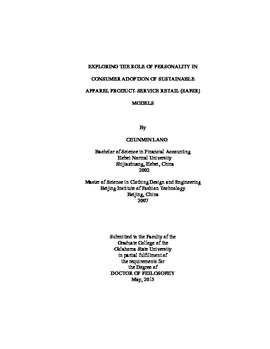| dc.contributor.advisor | Armstrong, Cosette M. | |
| dc.contributor.author | Lang, Chunmin | |
| dc.date.accessioned | 2016-09-29T18:35:40Z | |
| dc.date.available | 2016-09-29T18:35:40Z | |
| dc.date.issued | 2015-05 | |
| dc.identifier.uri | https://hdl.handle.net/11244/45181 | |
| dc.description.abstract | According to the concept of Product-Service System (PSS), a new concept called Sustainable Apparel Product-Service Retail (SAPSR) was developed to minimize the environmental impact of consumption by lowering material consuming levels and increasing the life span of existing clothing products. Five retail-oriented SAPSR models are proposed in this study, including redesigned clothing, repair/alteration, renting, clothing swaps and consultancy. The primary goal of this research is to evaluate the influence of personality (fashion leadership, need for uniqueness, and materialism) on consumers' intention to adopt the new SAPSR models; and by applying the theory of planned behavior (TPB), to examine the indirect relationships between personality traits with the intention to adopt new SAPSR models. | |
| dc.description.abstract | An online survey was conducted to collect data among female populations in the United States. Data cleaning generated 431 valid responses. All the variables were measured by 6-point Likert scales. Structural equation modeling (SEM) was used in this research to test the proposed hypotheses. The results indicate that each personality trait has a different influence on consumers' intention to adopt the new SAPSR models, and the demographics, including age, income and education, have a moderate influence on the relationships between personality traits and the adoption of SAPSR models. The results of this study also uncover that the relationships between personality and SAPSR models are mediated by TPB variables, including past sustainable consumption behavior, internal perceived behavior control and attitude toward sustainable purchasing. | |
| dc.description.abstract | The implications in theory and practice of this study are discussed. The findings in this research allow scholars and managers to gain a comprehensive view of factors influencing consumers' intention to adopt the new SAPSR business models. The results will help SAPSR retailers to better evaluate their target consumers and to formulate and implement effective marketing strategies. | |
| dc.format | application/pdf | |
| dc.language | en_US | |
| dc.rights | Copyright is held by the author who has granted the Oklahoma State University Library the non-exclusive right to share this material in its institutional repository. Contact Digital Library Services at lib-dls@okstate.edu or 405-744-9161 for the permission policy on the use, reproduction or distribution of this material. | |
| dc.title | Exploring the role of personality in consumer adoption of sustainable apparel product-service retail (SAPSR) models | |
| dc.contributor.committeeMember | Clare, Greg | |
| dc.contributor.committeeMember | Washburn, Isaac J. | |
| dc.contributor.committeeMember | Swinney, Jane | |
| osu.filename | Lang_okstate_0664D_13926.pdf | |
| osu.accesstype | Open Access | |
| dc.type.genre | Dissertation | |
| dc.type.material | Text | |
| thesis.degree.discipline | Human Sciences | |
| thesis.degree.grantor | Oklahoma State University | |
